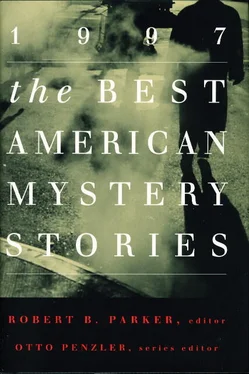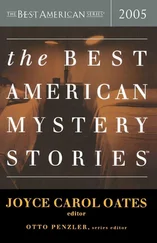“You’re kidding,” she said, her hand clapped to her mouth. When he didn’t smile, she dropped her hand and said, genuinely shocked, “You’re not.”
And then, perceptive reporter that she was, she cut to the heart of the matter: “Why, Terry?”
He played with his wineglass. “Because there are bad guy’s out here, and the only way to keep them from winning is to do everything you can to be one of the good guys.”
She frowned. “Everything you can?”
“All I can — the best I can.”
She shook her head. “But history—”
“Nobody really understands history. Not really. Not all the way.”
She nodded in agreement. “Okay — let’s leave history out of it. What makes me so afraid right now, is the ‘everything you can’ thing. If you do everything you can stop the world’s bad guys, don’t you end up committing the same kind of crimes you most want to prevent?”
“Sometimes. If you let yourself,” Terry said evenly. He looked at her, his face dead serious. “But I’ll never let myself.”
Her eyes told him she wasn’t sure about that.
“Believe me, Maggie,” he said, “I could never become the same thing I’m fighting against.” He took a sip of wine and returned her stare. “Because if you do that, you stop being political — you simply become a criminal. I know — I’ve seen it happen. And I don’t like it.”
He saw she had tears in her eyes. “What’s the problem?”
“I love you so much,” she said.
And so they agreed to a truce. He was never totally explicit with her about the details of his covert existence. There were clandestine meetings that he went to, and trips he took suddenly. But the specifics were never discussed between them. She had insisted on that, and he honored her request. Unlike Terry, who used his writing as a cover and considered himself a dilettante, Maggie’s appointed role in life was professional journalist, and sometimes she felt torn between the ideals she had learned as a student at Northwestern University’s Medill Graduate School of Journalism and the hard-edged economic, political, and social realities with which she now came in contact on a daily basis.
She had been twenty-six when she’d met Terry; less than three years out of grad school, the Midwest patina of her childhood in Lakewood, Ohio, barely scrubbed away. She had known from the age of twelve she would be a journalist, and she had worked hard to achieve that goal, waitressing her way through Ohio State University, winning a scholarship to Medill, and, following her graduation, moving to New York and a greenhorn’s slot on the assignment desk of NBC News. She was vibrant and energetic and filled with the righteous indignation common to young practitioners of the journalist’s craft. Her job, she argued (often passionately), was to comfort the afflicted and afflict the comfortable.
It took her some months to reconcile what she did with what Terry did. She was a child of the sixties blessed (or cursed) with the antagonism toward government common to most of her generation. And yet she respected, albeit somewhat grudgingly, what Terry did. He supported the system and was willing to put himself on the line for his beliefs. And so, despite Maggie’s negative feelings about such things as the war in Vietnam, Nixon’s presidency, and the way Henry Kissinger ran U.S. foreign policy, she understood Terry’s commitment (perhaps it was her conservative Lake-wood upbringing) to his agency and to their Nation.
Not that she didn’t experience emotional conflicts. She approved of what her husband did. But she also realized the disasters that could befall them if her friends and colleagues from Rome’s American journalistic community ever found out about Terry’s covert activities. Like it or not, Maggie was drawn inside the double-edged existence shared by all spies’ families: the cover stories and outright lies that have to be told in order to survive. Lying to her friends and colleagues did not sit easily with her. And yet she did what she had to do, because her husband’s safety depended on her constancy and consistency.
She’d experienced more of those conflicts in Italy than she did in Israel. Italy in the mid-seventies was fertile turf for Terry’s clandestine operations. The Red Brigades were active. The Libyans, rich with petrodollars and vehemently anti-American, bought their way into foundering Italian corporations. The Communist Party controlled newspapers, labor unions, and thousands of local politicians. In Italy there was a lot for Terry to do — and he worked continually on Agency business while Maggie produced infrequent two-minute news stories about the Pope, earthquakes, and the anarchy of Neapolitan society, all the time fretting quietly about her husband’s safety.
In Israel things were different. Liz made the biggest change in their lives, of course. The kid had been unplanned, the result of a trip to Venice. Terry had asked her to come along with him at the last minute, she’d forgotten to pack her diaphragm, and the rest was history. Maggie had always sworn to herself she wouldn’t have a child until she had won her first Emmy. The day Liz was born she’d realized what a real award she’d been given. Not that she was any less ambitious, it was simply that her ambitions now had two objectives: a terrific daughter and great news stories. After her layoff, she found herself less and less inclined toward the eighteen-hour days she’d willingly put in as a network producer, preferring to spend time with Liz and putter in the garden between writing assignments.
Their move from Italy, she noticed, had affected Terry as well. Israel was an ally, a friendly oasis in a hostile environment. If Terry were operating in Jerusalem, he showed no sign of it, working on freelance journalism and his part-time job at the Post’s grimy Romema headquarters and most every day coming home for lunch, a nap, and a couple of hours’ playtime with Liz. He’d told her that Israel would be a virtual vacation for him, and that seemed to be the case.
“Friends don’t spy on each other,” he’d insisted. “I’m an expert on Communist labor unions, not the Histadrut.”
And the PLO?
“Geez, Mag, the Israelis have those guys cold. I couldn’t find out one thousandth of what the Shin Bet’s got on Arab terrorists even if I were fluent in Arabic and had Yasir Arafat his bloody self on my payroll.”
Still, he’d developed professional contacts — Maggie was sure of it — among the left-wing members of Israel’s parliament, the Knesset. And he went out of his way to cultivate a few of the more moderate West Bank Palestinian Arabs.
Israel was not Italy. There were no late-night assignations, no dead drops or one-time cipher books. There were no calls to Maggie from pay phones that went, “I gotta see a man about a horse, darlin’,” his way of letting her know he might not be home for a few hours or a few days. There was none of the perpetual, gnawing, unspoken dread Terry Robinson had come to know in his gut, the brickbat pain that hit him like an ulcer when he worked the streets alone and unprotected. He’d felt those twinges for twenty years, in Rome, Paris, Amsterdam, and London.
No, Israel was different. Strange for him, a Christian in a Jewish homeland, that he felt so comfortable in this rough country of olives and orange groves and scrub-brush wadis, this raw, unsophisticated place with its boy soldiers and bearded Hasids and breakneck drivers. He loved Israel’s vitality, took pleasure in its adolescent chauvinism, its matter-of-fact fatalism, its almost professional irreverence. He’d come to feel safe walking Israel’s crowded streets and visiting its historic sites.
He watched as Liz laid the bear on her cot, fussing, tucking it under the covers tightly, its nappy head right in the middle of the pillow.
Читать дальше












